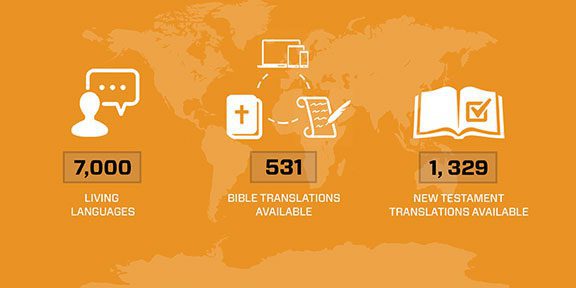With developing technology, biblical translation is happening faster than ever.
Bible translation has always been a complicated and often controversial process.
From the moment that Martin Luther first translated the Bible into German, he sparked a movement to translate the word of God into the heart language of every believer, a mission that continues today.
Out of more than 7,000 living languages, the complete Bible has only been translated into 531, with the New Testament currently available in 1,329. However, thousands of translations are in progress as new technology has emerged to simplify and speed up the process. Yet not everyone has embraced the new technology, which is rapidly changing the way that work that began two millennia ago is being completed today.
 David Reeves, director of technology advancement at Wycliffe Associates, has been involved in Bible translation for 31 years, including 18 years spent working with language groups in Indonesia with Wycliffe USA. He left to start the technology department at Wycliffe Associates, where he works to continuously develop and improve the technology of translation.
David Reeves, director of technology advancement at Wycliffe Associates, has been involved in Bible translation for 31 years, including 18 years spent working with language groups in Indonesia with Wycliffe USA. He left to start the technology department at Wycliffe Associates, where he works to continuously develop and improve the technology of translation.
Since the advent of the personal computer, translation technology has advanced at an ever-increasing rate. With new technology often comes mistakes, as apps and software are tested and improved. Reeves said that while mistakes are inevitable, the benefits of speed and ease of use outweigh the risk.
“Wycliffe Associates could certainly fall into the category of early adopters; we know it’s going to make mistakes,” he said. The digital nature of modern-day publishing makes these mistakes easy to correct.
New translations are typically led by existing churches who are capable of translating the Bible into their native language or by trained linguists who go into communities and translate the Bible for them. The former is motivated by a desire to read the Bible in the language spoken within the community, the second is often by a desire to translate the Bible into every remaining language, whether it has been requested or not.
Reeves says it’s important to allow local groups to complete the translations themselves.
“Some of my colleagues fail to see the value of allowing [the translation] to be messy at the beginning stages so that they have ownership of it,” Reeves said. “You release it early and often in digital form, and you correct it and re-release it again.”
He says that the demand for translations makes the outsider method impractical.
“The global church has grown phenomenally, and now it’s outstripping the ability of any past paradigms to be able to supply it,” Reeves said. “Technology has brought about a lot of options that were not available even 20 years ago.”
The technology, though, hasn’t replaced the need for a personal touch.
“It will never replace the human,” he said. “But you’ve got tools now that speed the process exponentially.”
One of these tools is Sovee, a smart engine that works off of a word list to translate the entire Bible at once. Local translators then comb over the text, correcting it verse by verse. As the translation is worked on, Sovee learns the language and translates the same words in the same way.
“Only the human can say, ‘yes, this sounds natural,’ but it can get a draft quickly and as you improve it, it improves the whole text,” he said.
Another common tool is MAST, a collaborative translation method, which speeds the process so that an entire draft of the New Testament can be translated in months, instead of years. MAST brings national translators and church leaders together and allows for editing throughout the translation process.
New tools are also being developed to meet the needs of churches in areas that are hostile to Christianity.
According to researchers at Open Doors, a nonprofit that serves persecuted Christians in hostile countries around the world, in 2014 alone more than 4,000 Christians were killed, and 1,000 churches were attacked for their faith.
In hostile areas, translating and reading the Bible is still illegal and often dangerous work. For these communities, technology has made it easier to continue to work in secrecy.
The print on demand system allows these faith groups to quickly print Bibles from a flash drive and then organize them into binders to avoid easy detection. In some countries, it’s illegal to print anything without government approval and in others, paper purchasing is closely monitored by the state. For these areas, mobile technology has made an impact.
“There are more cellphones than people right now,” Reeves said. “That opens everything up.”
- Search the Bible online at biblegateway.com
- Compare translations of the Bible at biblestudytools.com
- Become a volunteer grader for The Salvation Army’s Bible Correspondence Courses, which are issued to inmates in correctional facilities nationwide. Email bob.zerhusen
@usw.salvationarmy.org for more information.
Several apps conduct instant, though rough, translations, which can then be improved upon. Since mobile devices have become so common, believers are able to read the Word on their phones without attracting attention.
“We supply the technology, but they have to accept the risk,” he said.
Wycliffe Associates alone will begin work on 800 translations in the coming year, with 250 currently underway.
Translation work is also being done in more remote areas where Internet connections and electricity are unavailable.
Bible translation kits allow these churches to connect with translators and access software through solar-powered laptops and satellite Internet modems. Translators can work from anywhere and communicate effectively with translation consultants thousands of miles away. This technology can reduce translation time by up to three years.
Ultimately, perhaps the biggest impact technology has had on translation work is the democratization of the work, which allows people around the world who want to read the Bible in their own languages to create a new translation for themselves.
“Bible translation belongs to the church,” Reeves said. “If we align ourselves to God’s ultimate, the task could be done and we will move on to whatever the church needs next.”












